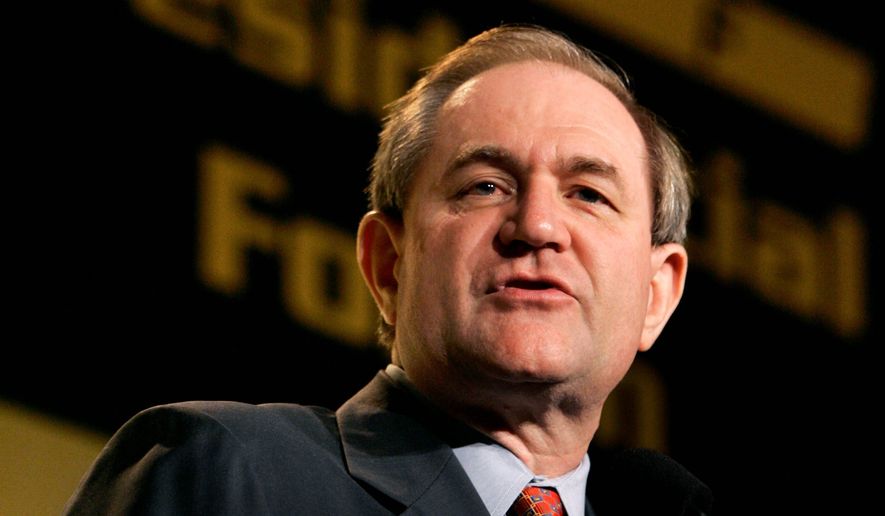Concerned that the GOP is tilting too far toward isolationism, former Virginia Gov. James S. Gilmore III is traveling to New Hampshire later this week to argue for a renewed emphasis on U.S. leadership in tackling world hot spots.
The trip to an early presidential primary state could also spark conversation about Mr. Gilmore’s own intentions in 2016 — though he said the journey shouldn’t be viewed as testing the presidential waters.
Mr. Gilmore said Wednesday he will call on Republicans to embrace a more muscular brand of foreign policy and push back against the likes of Sen. Rand Paul, a likely contender for the GOP presidential nomination who has warned about the unintended consequences of military adventurism.
“Barack Obama is wrong in sending a message of pullback in this country, and I am not sympathetic to Republicans who feel that way either,” Mr. Gilmore told The Washington Times. “We have to have a forward-leaning foreign policy and national security policy. We are the only people that can provide stability in the 21st century — the way we did in the 20th — and we are not doing that.”
The rise of the Islamic State in Syria and Iraq, the recent bloodshed in the Israeli-Palestinian conflict and tensions between Russia and Ukraine have helped to push foreign policy issues back into the national headlines and renewed debate over what role the U.S. should play in global affairs in the wake of costly wars in Iraq and Afghanistan.
Mr. Gilmore joins a long list of Republicans making stops in New Hampshire, which holds the first-in-the-nation primaries.
SEE ALSO: Critics of George W. Bush’s foreign policy now taking heat themselves
New York Rep. Peter T. King, who has visited New Hampshire more than a half-dozen times the past two years and is openly flirting with a presidential run, is also calling for a robust foreign posture, and has said Mr. Paul’s foreign policy vision is bad for the GOP.
“Whether it’s me or someone else, I want to do all that I can to make sure that what I call the realistic foreign policy wing and national security wing of the Republican Party does not give in to the isolationists.” Mr. King said on CNN earlier this year.
Asked about Mr. Paul’s approach to world affairs, Mr. Gilmore struck a similar note, telling The Times, “I think that type of approach is dangerous and not realistic in the modern world that we are facing right now.”
Brian Darling, Mr. Paul’s communications director, said that his boss’s foreign policy approach is being mischaracterized.
“The only way for some people to get attention apparently is to lie about prominent public figures,” Mr. Darling said. “The people of New Hampshire are smarter than that. Sen. Paul believes in strong national defense, peace through strength and a realist foreign policy. Anyone who says otherwise is engaging in mudslinging and name-calling.”
In a recent Wall Street Journal op-ed, Mr. Paul outlined his own approach, cautioning against listening to “interventionists” on foreign affairs and said a “more realistic foreign policy would recognize that there are evil people and tyrannical regimes in this world, but also that America cannot police or solve every problem across the globe.”
Analysts said the debate is part of an ongoing battle over foreign policy within the Republican ranks.
“The unrest in the Middle East, the rise of ISIS and the turbulence in the Ukraine means that more Republicans want a president that is seriously engaged in creating effective outcomes that positively impact the United States,” said Ron Bonjean, a GOP strategist. “If an ISIS terrorist attack were to occur on American soil today, those Republicans who prefer isolationism would lose credibility and support within the GOP ranks.”
But libertarian-leaning analysts say the public’s attitude is shifting, and the GOP needs to move with them.
“Based on the experience of the GOP — especially in the 2008 election and, to a lesser extent, the 2006 and 2012 elections — it is pretty obvious that the association of the party with a muscular foreign policy, if that is what Jim Gilmore is calling it, has not been good for the party,” said Christopher A. Preble, vice president for defense and foreign policy studies at the Cato Institute. “It has undermined the party’s reputation in terms of its wisdom being associated as it is with an extremely unpopular war — especially the war in Iraq.”
Mr. Gilmore served one term as Virginia governor, and from 1999 to 2003 he was chairman of the Advisory Panel to Assess Domestic Response Capabilities for Terrorism Involving Weapons of Mass Destruction, also known as the Gilmore Commission.
He also served as chairman of the Republican National Committee from 2001 to 2002. He briefly ran for the GOP nomination for president in 2008 before dropping out and running for the U.S. Senate, where he was handily defeated by Mark R. Warner, another former Virginia governor.
Mr. Gilmore’s trip to New Hampshire follows stops in Oregon, Colorado and Virginia, where he delivered a similar message on foreign policy.
Mr. Gilmore said his message is based on the idea that in order to have a strong national security, the country needs to pursue reforms that boost economic growth.
In New Hampshire Mr. Gilmore will be joined by Louisiana Gov. Bobby Jindal, another potential 2016 presidential contender, at the Seacoast Republican Women’s 15th Annual Chili Fest and the 12th annual Stafford County Barbecue.
Mr. Gilmore also said he will talk to volunteers at the Republican National Committee victory office in Nashua.
• Seth McLaughlin can be reached at smclaughlin@washingtontimes.com.




Please read our comment policy before commenting.